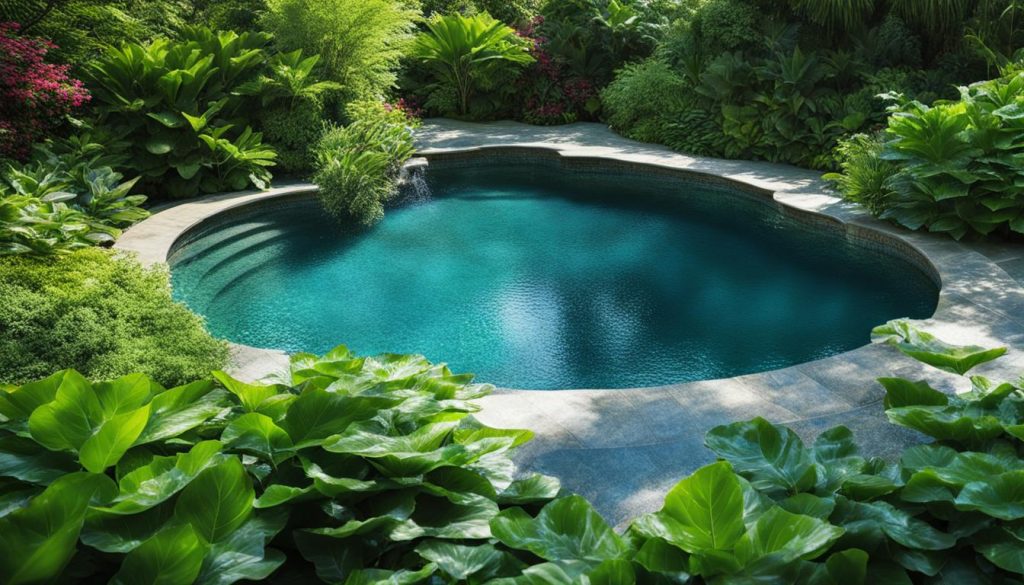Welcome to our guide on choosing between saltwater and chlorine pools! If you’re in the market for a new pool or considering upgrading your current one, it’s important to weigh the pros and cons of each option to ensure that you’re making an informed decision. The type of pool you choose can have a significant impact on your swimming experience, maintenance requirements, and overall costs.
In this section, we’ll explore the key factors to consider when deciding between a saltwater pool and a chlorine pool. We’ll help you understand each type of pool, the benefits and drawbacks of each, and what you need to know to make an informed decision.
Key Takeaways:
- Choosing between a saltwater and chlorine pool requires consideration of various factors.
- Each type of pool has its own unique benefits and drawbacks.
- Your personal preferences, location, and budget should influence your decision.
- Maintenance requirements and long-term costs should also be taken into account.
- Ultimately, the choice between a saltwater and chlorine pool depends on your specific needs and desired swimming experience.
Understanding Saltwater Pools
Now that we’ve gone over the basics of saltwater vs. chlorine pools, let’s take a closer look at saltwater pools. While they may be less common than traditional chlorine pools, saltwater pools have been gaining popularity in recent years due to the many benefits they offer.
How Do Saltwater Systems Work?
A common misconception about saltwater pools is that they do not have chlorine. In reality, saltwater pools do use chlorine to keep the water clean and safe for swimming. The difference lies in how the chlorine is generated. Instead of adding chlorine to the water directly, saltwater pool systems use a generator to convert salt into chlorine.
This process eliminates the need to handle and store traditional chlorine products, which can be dangerous and irritating to the skin and eyes. The result is a gentler, more natural swimming experience.
The Benefits of Swimming in Saltwater
Swimming in saltwater has a number of benefits for your skin, hair, and overall health. Saltwater has natural exfoliating properties, which can leave your skin feeling smoother and softer. It also has antibacterial properties, which can help reduce the risk of skin infections.
In addition, saltwater can be beneficial for individuals with respiratory issues, such as asthma or allergies. The high salt content can help clear your sinuses and improve breathing function.
Maintenance Requirements for Saltwater Pools
While saltwater pools have many advantages, they do require some additional maintenance compared to traditional chlorine pools. The saltwater generator must be monitored regularly to ensure it is functioning properly, and the pH and alkalinity levels of the water must be carefully balanced to avoid damage to the generator and other pool equipment.
It’s also important to note that while saltwater pools require less chlorine overall, the salt can corrode certain types of pool surfaces and equipment if not properly maintained. This means that regular cleaning and maintenance is essential to keep your saltwater pool running smoothly.
Overall, saltwater pools can offer a more natural and enjoyable swimming experience, with the added benefits of gentler chlorine and improved skin and respiratory health. However, it’s important to weigh these benefits against the additional maintenance requirements and potential expenses before making a decision.
Pros and Cons of Chlorine Pools
Chlorine pools are the most traditional and commonly found pool type. They are preferred by many due to the advantages they offer.
Advantages of Chlorine Pools
The use of chlorine as a disinfectant is highly effective and helps prevent the growth of bacteria and algae.
Chlorine pools require less maintenance than saltwater pools, as the pH levels can be easily balanced with chemicals. Additionally, chlorine is much cheaper than salt, which can result in lower long-term expenses.

Chlorine pools are also easier to operate than saltwater pools, with a wider range of pool equipment available on the market. They can be installed and maintained by most professionals, and many DIY enthusiasts can operate them with ease.
Disadvantages of Chlorine Pools
The high concentration of chlorine in pools can cause skin and eye irritation, especially in those with sensitive skin. It can also cause damage to hair and bathing suits over time. Additionally, the use of chlorine in pools can result in a strong odor that’s unpleasant for some.
Frequent use of chlorine can lead to the accumulation of chemical by-products, such as chloramines, which can be harmful to pool users’ health.
Finally, chlorine pools have a more significant environmental impact than saltwater pools, as chlorine is a chemical that can have harmful effects on the ecosystem. Disposing of chlorine can be challenging, and it can lead to water pollution and contamination.
Overall, while chlorine pools offer many benefits, they come with some significant drawbacks, particularly regarding health and environmental impact. When making your decision, it’s essential to consider these factors carefully and choose the pool type that best fits your needs and preferences.
Comparing Maintenance Requirements
When it comes to maintaining a swimming pool, there are several key factors to consider. If you are deciding between a saltwater pool and a chlorine pool, one of the most important things to consider is the ease of maintenance and the associated costs. Let’s take a closer look at the maintenance requirements for both types of pools.
Saltwater Pools Maintenance
Saltwater pools require less maintenance than traditional chlorine pools. This is because the saltwater system is designed to automatically generate chlorine, so you don’t have to add it manually. However, there are still some maintenance tasks you’ll need to perform on a regular basis:
| Maintenance task | Frequency |
|---|---|
| Checking and adjusting pH levels | Weekly |
| Cleaning the salt cell | Every 3-6 months |
| Monitoring salinity levels | Monthly |
The good news is that these maintenance tasks are relatively simple. In fact, some saltwater pool owners find that they spend less time maintaining their pool than they did with a traditional chlorine pool.
Chlorine Pools Maintenance
Chlorine pools require more maintenance than saltwater pools. This is because you need to manually add chlorine to your pool to keep it clean and clear. Here are some of the maintenance tasks you’ll need to perform:
| Maintenance task | Frequency |
|---|---|
| Checking and adjusting pH levels | Daily |
| Adding chlorine | Daily or as needed |
| Cleaning the chlorinator | Every 3-6 months |
As you can see, chlorine pools require more frequent monitoring and maintenance tasks. This can be time-consuming and may require more money spent on chemicals and supplies.
Overall, when comparing maintenance requirements, it’s clear that saltwater pools require less maintenance than traditional chlorine pools. This can be a significant factor to consider when making your decision.
Cost Considerations: Saltwater vs. Chlorine Pools
When it comes to deciding between a saltwater pool and a chlorine pool, cost is a key factor to consider. Let’s take a closer look at the upfront costs and long-term expenses of each type of pool.
Upfront Costs
The installation costs of a saltwater pool are generally higher than those of a chlorine pool. This is because the saltwater system itself is more expensive, and additional equipment such as a salt cell generator and a control panel are required. On the other hand, chlorine pools have lower upfront costs but require regular purchases of chlorine and other chemicals.
Tip: If you’re on a tight budget but still want to enjoy the benefits of a saltwater pool, you can consider installing a saltwater conversion kit on your existing chlorine pool.
Long-Term Expenses
While the upfront costs of a saltwater pool may be higher, the long-term expenses can be lower compared to a chlorine pool. This is because saltwater pools require less maintenance and fewer chemical purchases over time. Additionally, saltwater pools have a longer lifespan than chlorine pools, which can save you money on replacement costs in the long run.
Tip: To save on long-term expenses, make sure to properly maintain your saltwater pool and keep the water balanced. This will help prevent equipment breakdown and prolong the lifespan of your pool.
| Saltwater Pool | Chlorine Pool | |
|---|---|---|
| Upfront Costs | Higher | Lower |
| Long-Term Expenses | Lower | Higher |

Overall, when considering cost, it’s important to weigh both the upfront costs and long-term expenses of each type of pool. This will help you make a decision that aligns with your budget and preferences.
Health and Environmental Impact
When it comes to health benefits and environmental impact, there are clear differences between saltwater and chlorine pools.
First, let’s talk about the health benefits of saltwater pools. Because saltwater pools use a natural form of chlorine, swimmers are less likely to experience skin and eye irritation compared to traditional chlorine pools. Additionally, the saltwater in these pools can have a therapeutic effect on the skin and respiratory system.
On the other hand, chlorine pools may have some health risks associated with them. The smell of chlorine is often strong, which can cause respiratory irritation, especially for those with preexisting conditions like asthma. Additionally, chlorine has been linked to an increased risk of cancer and other health issues.
When it comes to environmental impact, saltwater pools are generally considered to be more eco-friendly. Saltwater systems don’t require the same amount of harsh chemicals as chlorine pools, which means less chemical waste going into the environment. Additionally, the saltwater itself can be less damaging to the surrounding ecosystem compared to chlorine.

However, it’s important to note that even saltwater pools can have an impact on the environment if not maintained properly. Excess salt in the pool water can harm plants and soil if it’s drained or backwashed into the environment.
In summary, saltwater pools may offer more health benefits and have a lower environmental impact than chlorine pools. However, it’s important to ensure that the saltwater pool is maintained properly to minimize any potential negative effects.
Making Your Choice: Factors to Consider
Now that we’ve explored the key differences between saltwater and chlorine pools, let’s take a closer look at the factors you should consider when making your decision.
Preferences
First and foremost, it’s important to consider your personal preferences when it comes to pool ownership. Do you prefer the feeling of swimming in saltwater, or do you like the familiar smell of chlorine? What about the appearance of the water? Take some time to think about what matters most to you in terms of your overall swimming experience.
Location and Climate
Another important factor to consider is the climate and environment in your location. If you live in an area with hot, humid summers, a saltwater pool may be a better option, as saltwater is less harsh on the skin and eyes. On the other hand, if you live in a colder climate with a shorter swimming season, a chlorine pool may be more practical for you.
Maintenance Requirements
The maintenance requirements of each type of pool can vary significantly. Saltwater pools require less maintenance overall, but may require more careful attention to water chemistry and the condition of the salt cell. Chlorine pools require more frequent testing and the addition of chemicals, but these tasks are relatively simple and straightforward. Consider how much time and effort you’re willing to put into pool maintenance before making your decision.
Cost Considerations
There are both upfront and long-term costs to consider when choosing between saltwater and chlorine pools. Saltwater pools may have higher upfront installation costs, but can save you money in the long run due to lower chemical and electricity usage. Chlorine pools are typically less expensive to install, but can be more costly to maintain over time. Be sure to weigh your options carefully and consider your budget before making your final decision.
Health and Environmental Impact
Finally, it’s important to consider the impact that saltwater and chlorine pools can have on your health and the surrounding ecosystem. Saltwater pools are generally considered to be healthier for both swimmers and the environment, as they require fewer chemicals and produce fewer harmful byproducts. Chlorine pools may cause skin and eye irritation in some swimmers, and can potentially harm local plants and wildlife. Take these factors into account as you make your decision.
By weighing these important factors, you can make an informed decision about whether a saltwater or chlorine pool is the right choice for you. Remember, there is no right or wrong answer – it all comes down to your personal preferences and priorities.
If you have any questions, our team is always happy to help. Pool Installers is your premier destination for professional pool installation services. Our expert team specializes in installing fiberglass, vinyl, and concrete pools. Whether you prefer the sleek design of fiberglass, the versatility of vinyl, or the durability of concrete, we bring your dream pool to life with precision and excellence. Rely on Pool Installers for a seamless and customized approach to creating your ideal aquatic oasis.
FAQ
What is the difference between a saltwater pool and a chlorine pool?
Saltwater pools use a salt chlorine generator to convert salt into chlorine, while traditional chlorine pools rely on manually adding chlorine to the water.
What are the benefits of a saltwater pool?
Saltwater pools offer a gentler swimming experience, as the water is softer and less harsh on the skin and eyes. Additionally, saltwater pools require less frequent chlorine maintenance and can help reduce the risk of red eyes and skin irritation.
What are the maintenance requirements of a saltwater pool?
Saltwater pools require routine testing of the water’s salinity levels and pH balance. They also require occasional cell cleaning and inspection to ensure proper operation of the salt chlorine generator.
What are the advantages of a chlorine pool?
Chlorine pools are effective at killing bacteria and maintaining water clarity. They are also generally more affordable to install upfront compared to saltwater pools.
What are the disadvantages of a chlorine pool?
Chlorine pools can cause skin and eye irritation, especially if the chlorine levels are not properly balanced. Additionally, chlorine pools require more frequent maintenance and testing to ensure adequate disinfection.
How do the maintenance requirements of saltwater pools compare to chlorine pools?
Saltwater pools generally require less maintenance than chlorine pools. However, they may require occasional cell cleaning and inspection to maintain proper chlorine production. Chlorine pools require regular monitoring of chlorine levels and pH balance, as well as routine shock treatments.
How do the costs of saltwater pools compare to chlorine pools?
Saltwater pools typically have higher upfront costs due to the installation of a salt chlorine generator. However, they may have lower long-term expenses, as salt is less expensive than chlorine and there is less need for additional chemicals. Chlorine pools have lower upfront costs but may require more frequent chemical purchases.
Are saltwater pools healthier and more environmentally friendly?
Saltwater pools are generally considered to be more skin and eye-friendly, as the water is softer and contains fewer harsh chemicals. However, both saltwater and chlorine pools can be maintained at safe and healthy conditions. In terms of environmental impact, saltwater pools require fewer chemicals to be added, which can reduce the overall environmental impact.
What factors should I consider when choosing between a saltwater pool and a chlorine pool?
When making your decision, consider factors such as your personal preferences, desired swimming experience, location, budget, and maintenance capabilities. Additionally, it may be helpful to consult with a pool professional to determine which type of pool is best suited for your specific needs.

